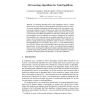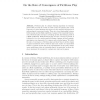17 search results - page 3 / 4 » sagt 2010 |
SAGT
2010
Springer
14 years 10 months ago
2010
Springer
Can learning algorithms find a Nash equilibrium? This is a natural question for several reasons. Learning algorithms resemble the behavior of players in many naturally arising gam...
109
Voted
SAGT
2010
Springer
14 years 10 months ago
2010
Springer
Abstract. We consider network congestion games in which a finite number of non-cooperative users select paths. The aim is to mitigate the inefficiency caused by the selfish users...
105
Voted
SAGT
2010
Springer
14 years 10 months ago
2010
Springer
Abstract. We consider the existence of Partition Equilibrium in Resource Selection Games. Super-strong equilibrium, where no subset of players has an incentive to change their stra...
114
Voted
SAGT
2010
Springer
14 years 10 months ago
2010
Springer
Fictitious play is a simple learning algorithm for strategic games that proceeds in rounds. In each round, the players play a best response to a mixed strategy that is given by the...
124
click to vote
SAGT
2010
Springer
14 years 10 months ago
2010
Springer
The PPAD-completeness of Nash equilibrium computation is taken as evidence that the problem is computationally hard in the worst case. This evidence is necessarily rather weak, in ...


